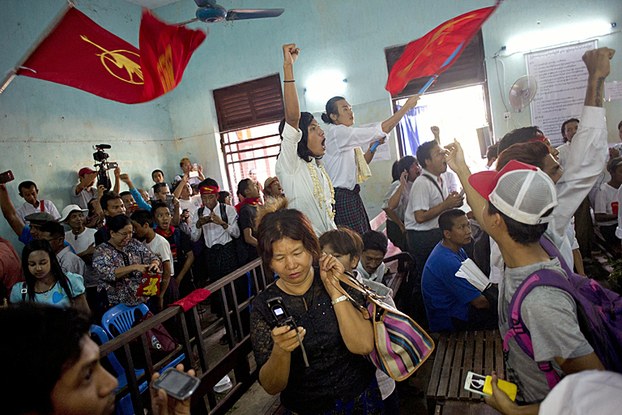Myanmar government to let blacklisted democracy activists return from exile
| Publisher | Radio Free Asia |
| Publication Date | 26 May 2016 |
| Cite as | Radio Free Asia, Myanmar government to let blacklisted democracy activists return from exile, 26 May 2016, available at: https://www.refworld.org/docid/5760fc08c.html [accessed 21 May 2023] |
| Disclaimer | This is not a UNHCR publication. UNHCR is not responsible for, nor does it necessarily endorse, its content. Any views expressed are solely those of the author or publisher and do not necessarily reflect those of UNHCR, the United Nations or its Member States. |
2016-05-26
 Family members shout and cheer after student activists are released from prison in Tharrawaddy, central Myanmar's Bago region, April 8, 2016. AFP
Family members shout and cheer after student activists are released from prison in Tharrawaddy, central Myanmar's Bago region, April 8, 2016. AFP
The Myanmar government will allow exiled opposition activists who are still on an official "no-entry" blacklist to return to the Southeast Asian country within 100 days, said deputy foreign affairs minister Kyaw Tin on Thursday.
The move is the latest effort by the new civilian-led government under President Htin Kyaw and State Counselor and Foreign Affairs Minister Aung San Suu Kyi to make right the wrongs of the past in their push for democratic reform and development in Myanmar.
The Ministry of Foreign Affairs is working on granting full rights and protections to those who return, the same as they have received in the countries where they have been living, as well as remove their names from the country's immigration blacklist, Kyaw Tin said.
Thousands of Myanmar students, former political prisoners, and war refugees who fled the country as far back as the 1988 pro-democracy protests, which led to a military crackdown and international isolation, reside abroad primarily in the United States, Europe, New Zealand, South Korea, Singapore and Japan.
"We will ensure that people who went to foreign countries on account of their political beliefs can return within 100 days by working with relevant ministries, but this does not include those who cannot return home because they have committed crimes," Kyaw Tin said.
He also said that the foreign affairs ministry is considering changing its visa rules to expand their opportunities to remain in Myanmar since many of those in exile lost their citizenship when they were blacklisted by the military junta that ruled the country for 50 years until 2011.
"We welcome the Ministry of Foreign Affairs' plan to remove people from the blacklist and extend visa terms," said Naing Aung, a leader of the All Burma Students Democratic Front formed in the aftermath of the crackdown on pro-democracy protests in 1988.
Naing Aung, who had been living in Thailand, returned to Myanmar briefly in August 2012 after he was removed from the blacklist of potential state enemies under former President Thein Sein. He had tried back then to persuade the government to extend the reprieve to all exiled dissidents.
"We are trying to return home because we want to work with the new democratic government led by Aung San Suu Kyi," he told RFA's Myanmar Service. "It would not be a bad idea to let people who have been working on democracy and human rights since 1988 return home."
Prisoner releases
Aung San Suu Kyi's first act as state counselor after her National League for Democracy (NLD) party took office in early April was to arrange for the release of political prisoners and detained students in the country's jails, although some still remain behind bars.
Thein Sein, who also released scores of political prisoners during his five-year administration, removed the names of nearly 2,100 opposition activists and dissidents living in self-imposed exile from the junta's blacklist in August 2012 as part of his political reforms.
Foreign activists, journalists, historians, United Nations officials, and Aung San Suu Kyi's two sons who are British nationals were also among those whose names were removed. About 4,000 others remained on list at the time.
The foreign affairs ministry's move came as two advocacy groups issued a report on Wednesday about the problems that former political prisoners have experienced upon their release.
The Assistance Association for Political Prisoners and Former Political Prisoners Society, which jointly issued the report, have urged the government to change Myanmar's constitution and other laws to reduce the number of political prisoners held in the country's jails, the Myanmar Times reported.
Reported by Nay Rein Kyaw for RFA's Myanmar Service. Translated by Khet Mar. Written in English by Roseanne Gerin.
Link to original story on RFA website
